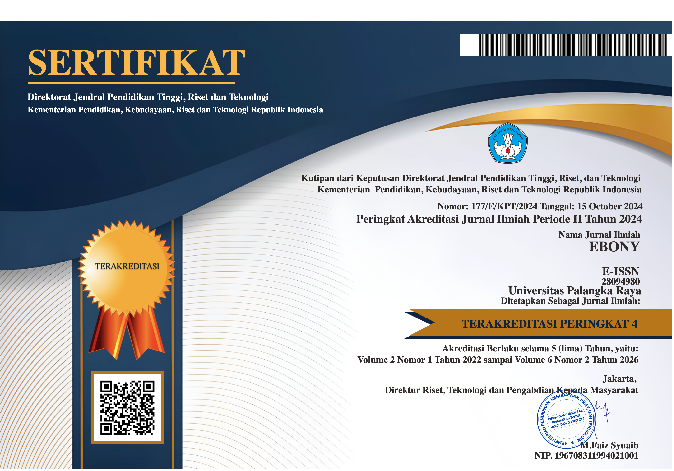Developing e-Book of Reading for Intensive Course in Virtual Classroom: Students’ Need Analysis
DOI:
https://doi.org/10.37304/ebony.v2i2.5280Keywords:
developing e-book, intensive course, virtual classroom, need analysisAbstract
This research clarifies the demands of students through need analysis concerning the content of e-book of reading for Intensive Course in virtual classroom, and the questionnaire was distributed to one hundred and twelve (112) students of English Study Program of FKIP University of Palangka Raya to explore the necessity. The results showed that most students require: first, reading texts as instructional materials which are accompanied by English grammar and English expressions to lead students to expose both oral and written English in daily life communication with other people using ICT (100%). Second, reading texts consist of 200-250 words (87.50%) which covered the topics of daily life and Dayak culture themes (.90%). Third, reading activity is to do reading a text and looking for detailed information (88.39%), and speaking activity is to discuss the exercises and tasks with peers (88.39%). Forth, writing input is about the explanation of the sentence structure used in the text, and writing activity that led them doing writing practice to write a text similar to the example given using their own sentence (82.84%). Fifth, learning activity on vocabulary and grammar cover pairing words with their meaning (89.28%), and write sentences according to the given pattern (100%). Last, the lecturer’s role acts as motivator and learners’ role are as responsive participants, and setting takes in virtual classroom or online learning. These signify student’s needs most which are as the basis for designing and developing e-book later.
Downloads
References
ChanLin, L, J. 2011. Reading Strategy and the Need of e-Book Features. The Electronic Library Vol 31 No3, 2013.
Ivone, F.M, Jacobs, G.M, and Renandya, W.A. 2020. Far Apart, Yet Close Together: Cooperative Learning in Online Education. Studies in English Language and Education, 7 (2), 271-289. 2020
Klimova, B and Zamborova, K. 2020. Use of Mobile Applications in Developing Reading Comprehension in SLA. Educ. Sci.2020, 10, 391
Karani, E. 2017. Promoting Online Reading Habit Among Undergraduate EFL Students by Reviewing and Summarizing e-Journals to Complete Academic Tasks. ASSHER-ISSN 2352 – 5398, Volume 174.
Mandaria, R. N. ., Karani, E. ., & Bungai, J. . (2022). Teachers’ Perception Towards Local Content-Based English Materials of Speaking Skill for Young Learners. EBONY: Journal of English Language Teaching, Linguistics, and Literature, 2(1), 72–82. https://doi.org/10.37304/ebony.v2i1.4045
Nunan, D. 2010. A Task-Based Approach to Material Development. Advances in Language Literacy Studies. Vol 1, No 2; July 2010
Reid, C. 2016. eBooks and Print Books Can Have Different Effects on Literacy Comprehension. Fisher Digital Publication, 5-2016
Tomlinson, B. 2012. Material Development for Language Learning and Teaching. Cambridge: Cambridge University Press.
Yamac, A, & Öztürkii, E, (2019). How Digital Reading Differs from Traditional Reading: An Action Research. International Journal of Progressive Education, Volume 15 Number 3, 2019. pp. 207 – 222.
Downloads
Published
How to Cite
Issue
Section
License
Copyright (c) 2022 Elanneri Karani, Wahyuningsih Usadiati, Susanti, Sulamit Syeba, Otniel

This work is licensed under a Creative Commons Attribution-NonCommercial 4.0 International License.











